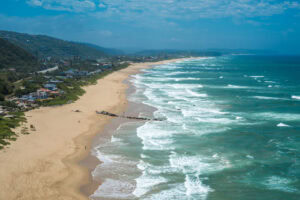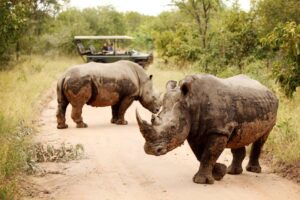South Africa is one of the most sought-after destinations for travellers, with its stunning landscapes, vibrant cities, and incredible wildlife.
While the country offers a wide variety of experiences, from city adventures to world-class South African safaris, US travel and UK travel advisories to this top safari destination often warn their citizens about crime.
South Africa has taken significant steps to improve safety in tourism hotspots.
The Deputy Minister of Tourism, Maggie Sotyu, announced the training of 2,300 tourism monitors nationwide ahead of the summer season. This initiative is funded through the South African government’s Expanded Public Works Programme, with R174 million allocated for its implementation. It aims to enhance security in popular tourist areas and attractions.

In August, some 2.3 million travellers (73% foreign visitors) passed through South Africa’s borders, including arrivals, departures, and transits.
International tourism to South Africa continues to grow, and our expert travel advisors are able to put your mind at ease with first-hand insights on planning your vacation.
Here’s how to enjoy South Africa’s best while keeping safety in mind.
Essential Emergency Contacts and Resources for Tourists in South Africa
The key to a peaceful trip, no matter the destination, is being prepared for any unexpected situation. Have access to emergency contacts and resources that can provide guidance and assistance; also keep in mind we provide 24/7 support for our clients.
Always keep copies of your travel insurance on you. Make sure you can contact your insurance provider for guidance on what steps to take should an incident occur.
If you experience an issue, report it to the nearest police station.
Emergency Services
Save important numbers to your phone before your trip and keep a hard copy.
- General Emergencies: 112
- Ambulance Services: 10177
- Police Services: 10111
- National Sea Rescue Institute: +27 434 4011
Medical Assistance
Contact local medical facilities or your travel insurance provider for assistance in a medical emergency.
Embassy Contacts
- British High Commission in Pretoria: For British tourists needing help.
Phone: +27 12 421 7500
- US Embassy: Located in Pretoria, the US Embassy can assist American citizens.
Phone: +27 12 431 4000
- German Embassy: Located in Pretoria.
Phone: +27 12 427 8900
- The Netherlands Embassy: Located in Pretoria, with a consulate in Cape Town.
Phone: +27 12 425 4500
Top South African Destinations to Explore

Cape Winelands
Known for its picturesque vineyards and gourmet food, the Cape Winelands is a must-visit for wine enthusiasts. Towns like Stellenbosch and Franschhoek are beautiful and well worth exploring.
Enjoy wine tastings, fine dining, and scenic drives through the lush countryside.
The wine tram is also a responsible way to enjoy the Winelands, as South Africa’s legal policy is zero tolerance for drinking and driving.
Garden Route
The Garden Route is famed for its breathtaking coastal scenery and outdoor activities. This stretch from Mossel Bay to Storms River has a host of incredible gems to explore.
Popular spots like Knysna and Plettenberg Bay offer a mix of adventure and relaxation, with excellent infrastructure for travellers.
Kruger National Park
For those looking to experience South Africa’s wildlife, Kruger National Park is one of Africa’s most popular safari destinations.
Luxury lodges offer fantastic amenities as well as game drives with expertly trained guides to spot the Big Five and other wildlife in their natural habitat.

South Africa is a top (and safe!) destination for travellers who want to experience world-class amenities, safari adventures to see the Big Five, and unspoilt natural environments.
Author: Chrizaan Troch
Published:
Last Update:
Part of the South Africa Safari, Birding Safaris, Lion Safaris & African Photo Safaris Collections